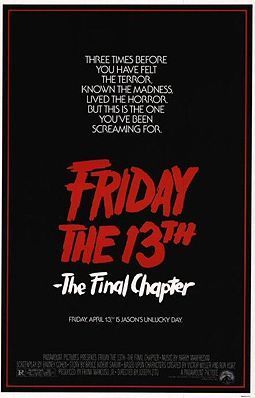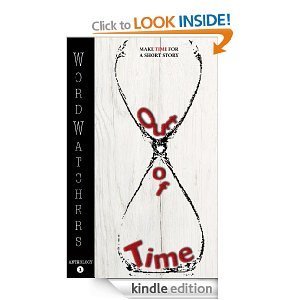Stuart Aken's Blog, page 243
September 13, 2013
Friday the 13th. Ooer!
 Friday the 13th: The Final Chapter (Photo credit: Wikipedia)You write fiction. In that occupation you probably have, as one aim, the spreading of your ideas and opinions. We are all storytellers, but we also tend to be preachers, if we’re absolutely honest with ourselves. Those subjects that most engage us form the themes of our stories. And our opinions about those themes permeate the text, whether we intend it or not. But, as authors in the electronic age, we’re expected to promote ourselves and our works on the web. Most of us run a blog or a website, or both. After all, the writer without an online presence is more or less invisible to those people who most matter to a writer; the readers.
Friday the 13th: The Final Chapter (Photo credit: Wikipedia)You write fiction. In that occupation you probably have, as one aim, the spreading of your ideas and opinions. We are all storytellers, but we also tend to be preachers, if we’re absolutely honest with ourselves. Those subjects that most engage us form the themes of our stories. And our opinions about those themes permeate the text, whether we intend it or not. But, as authors in the electronic age, we’re expected to promote ourselves and our works on the web. Most of us run a blog or a website, or both. After all, the writer without an online presence is more or less invisible to those people who most matter to a writer; the readers.There’s a great temptation to express our opinions on our blogs or websites, writing as ourselves and allowing our passions to spill over onto the electronic page. I know I’ve done it. And so, probably, have many of you. But is it wise?
I was inspired to write this piece because it’s Friday 13thtoday. The day has a significance and is a cause of superstitious dread to some individuals. Of course, the rationalist will pooh-pooh such superstition as irrational. And the person with a more emotionally based intelligence will sympathise, even empathise with the superstitious individual. If you, as a writer, express your opinion on your blog or website, where your words are your own, rather than those of a character you’ve invented, you stand the risk of alienating some of your potential readers.
Now, I have very definite views on superstition. But it would be foolish of me to express them here. I would inevitably cause offence to some of my readers. That isn’t helpful to the spread of my fiction, nor is it a particularly effective way to spread my ideas. Much more subtle and much more effective is the placing of my thoughts into the mouths of characters in a story to express my passionate views, preferably with some balancing arguments, so that the theme is available for both sides of the debate to claim as their own. Done cleverly, such exposition can influence readers. At the very least, it can make them think. Done badly, it is as bad as the bald expression of contentious issues on the blog.
So, if you side with the fox hunters, ride with the religious, condemn the poor, feel that justice is irrelevant, enjoy the subjugation of women, espouse the idea that there is no god, feel passionately that all people should be treated equally, or any of a huge number of emotionally divisive issues, the sensible thing to do is avoid them like the plague (as, of course, you should also avoid cliches) on your blog/website. Place them in the mouths of your characters, build your stories around them, make them the themes of your fiction. You will achieve much more than you would by proselytising and you won’t alienate half your readers in the process.
I’d love your thoughts, reactions, comments to this piece. Please feel free to say how you feel about the topic, and spread the word to your friends.Related articles
 Friday 13th wines.. If you dare!
Friday 13th wines.. If you dare!
 13 thoughts about Friday the 13th!
13 thoughts about Friday the 13th!
 Is Friday the 13th really that unlucky?
Is Friday the 13th really that unlucky?
 Investigating Friday the 13th
Investigating Friday the 13th
 Friday the 13th
Friday the 13th

Published on September 13, 2013 00:58
September 8, 2013
Minds That Hate, by Bill Kitson, Reviewed.
 With overtones of the political thriller, this crime novel from Bill Kitson is the latest in his series featuring DI Mike Nash. I hadn’t come across the author or his previous novels before I found this novel on the publisher’s website. Fantastic Books Publishing have done their usual great job in finding and exposing new and vibrant talent by giving this Bill Kitson an airing.
With overtones of the political thriller, this crime novel from Bill Kitson is the latest in his series featuring DI Mike Nash. I hadn’t come across the author or his previous novels before I found this novel on the publisher’s website. Fantastic Books Publishing have done their usual great job in finding and exposing new and vibrant talent by giving this Bill Kitson an airing. Written in the taut and pacey style of a good thriller, the book nevertheless develops the characters into fully fledged human beings, some of them definitely people you would not want to meet down a dark alley. Contrasting the evil of the antagonists is the basic goodness, flawed and imperfect, of the protagonists. And the developing, though uncertain, romance between police detective and local photojournalist brings light and warmth to what might otherwise be a tough read.
Bill Kitson exposes the underbelly of the world of the ambitious politician and lays bare the motivation and self-obsession of the psychotic criminal, getting deep into the minds of these unsavoury and dangerous characters. The reader is drawn into a world populated by nasty individuals whose only concerns lie in the furtherance of their own power or pleasure.
Struggling against this background, the world-weary detective has to deal with his own demons and a history of broken relationships, which superficially appear to have been no more than sexual encounters and even, perhaps, conquests. He must also work under the growing suspicion that those who control him in the chain of command are not what they should be.
Helping the male lead fight the dangers, doubts and difficulties of a case that grows more complex by the hour, is the overworked but basically honest and able reporter-cum-photographer working to keep the local newspaper afloat. She is the love interest and, as a strong woman with a mind of her own, lends balance to the relationship as well as to the story.
In the middle of all the political, criminal and sexual misdemeanours stands another victim, central to the plot and both controlling and controlled by the action. His position is one of impossibility; a situation that must eventually be resolved in the only way feasible.
This is a novel about murder, ambition, honesty, corruption, infidelity, lust, love, and justice. It is more than simply a crime thriller and manages to comment on the darker side of society without preaching. As regular readers of my reviews will know, character is the most vital element in a novel for me. This one is populated by real people: flawed, human, likeable or not, these are people who walk our streets, people you might meet in life. Some of them you would not want to exchange the time of day with, others you would avoid like the proverbial plague and others you would be happy to befriend.
I enjoyed the read and will be reading more of this author’s work in the future. I heartily recommend Minds That Hate to those who enjoy their fiction with depth as well as action.

Published on September 08, 2013 03:12
September 1, 2013
August: A Month of Maybes
 The writing, which is what this blog is really all about, has taken precedence this month, with 45% of my working time spent putting words onto paper (metaphorically speaking, of course, since I type direct to screen!). The third volume of the fantasy trilogy, provisionally titled ‘A Seared Sky’, is progressing at a good pace. The month started with 24,131 words and 6 chapters completed. It ended with 21 chapters and 81,672 words committed to the MS. That’s 57,541 words this month, or an average of 1,856 each day. Not as much as I’d like, but a reasonable move forward. Of course, I’ve also introduced another 5 named characters, and it takes time to develop such newcomers to the story. If you look at the post immediately prior to this, you’ll see how I go about that process.
The writing, which is what this blog is really all about, has taken precedence this month, with 45% of my working time spent putting words onto paper (metaphorically speaking, of course, since I type direct to screen!). The third volume of the fantasy trilogy, provisionally titled ‘A Seared Sky’, is progressing at a good pace. The month started with 24,131 words and 6 chapters completed. It ended with 21 chapters and 81,672 words committed to the MS. That’s 57,541 words this month, or an average of 1,856 each day. Not as much as I’d like, but a reasonable move forward. Of course, I’ve also introduced another 5 named characters, and it takes time to develop such newcomers to the story. If you look at the post immediately prior to this, you’ll see how I go about that process.The domestics have naturally played their part this month, with Valerie still unable to use one arm. The cast was supposed to come off last Thursday, and it did. But she’s still in some pain and they decided to replace it for another week. The new cast is slightly shorter, lighter and a rather fetching purple hue. We’ll both be heartily pleased to see the end of it and Valerie’s return to normal functioning. Mind you, the break has taught me things of which I was previously unaware; Valerie does a lot more around the house than I’d ever suspected. So, I’ll be helping out a little more than in the past.
I’ve done 3 sessions of updates on the Writing Contests page, see the tab above if you’re willing to try your hand at earning a bit of cash and kudos for your writing.
I’ve written 7 posts for this blog (which, by the way, has reached a minor milestone today, with 150,000 page views). Also read and reviewed 6 books. Naturally, I’ve spent a good deal of time in networking: engaged in short conversations on Twitter, Facebook, LinkedIn, Goodreads, Google+ and Pinterest. I enjoy exchanging ideas and thoughts with other people, so please do join me.
The coming month promises to be every bit as full as the last. Our daughter, Kate, reaches the significant age of 21 during the early part of September and we’ll be celebrating that rite of passage accordingly. Valerie and I will reach 25 years of wedded bliss (that’s a silver wedding anniversary, for those who are unfamiliar with such things) later in the month, and we intend to celebrate that event in style, meaning there will be a period during which I won’t be writing. That’s also likely to delay the report for September by a number of days.
I’m considering introducing some of the characters from my fantasy to readers here over the next few weeks, so look out for some character descriptions. And, I think that’s about it for now. As ever, I welcome your comments.
The accompanying chart is more or less self-explanatory, but here’s an explanation anyway:
The chart, explained:
 'Writing' - initial creation of stories, blog posts, reviews and longer works.'Editing' - polishing of all written work to make it suitable for readers.'Research' - discovery of info for story content, market research, contests and blog posts.'Reading' - books and writing magazines.'Networking' - emails, Twitter, Pinterest, Facebook, LinkedIn, Google+, and comments.'Admin' - story submission, blog posting, marketing, organisation, tax, and general admin tasks.Related articles
'Writing' - initial creation of stories, blog posts, reviews and longer works.'Editing' - polishing of all written work to make it suitable for readers.'Research' - discovery of info for story content, market research, contests and blog posts.'Reading' - books and writing magazines.'Networking' - emails, Twitter, Pinterest, Facebook, LinkedIn, Google+, and comments.'Admin' - story submission, blog posting, marketing, organisation, tax, and general admin tasks.Related articles
 July, a Month of Change and Progress
July, a Month of Change and Progress
 Not Enough for June?
Not Enough for June?
 10 Social Media Facts, Figures and Statistics You Need to Know
10 Social Media Facts, Figures and Statistics You Need to Know

Published on September 01, 2013 06:47
August 29, 2013
Character Development is Good for You.
 An example of my character template. The picture came via Flickr.com
An example of my character template. The picture came via Flickr.com and, if you click on it, it will lead to the photographer's gallery.Is it possible to write a story without at least one character? I seriously doubt it, even if the ‘character’ is only something inanimate. But is it desirable? Definitely not. Characters are the writer’s means of delivering story. Plot is a framework, a guide, sometimes a straightjacket, that determines a story’s direction and ultimate end. But it’s the character (or characters) who, taking the reader’s hand, guides her through the twists and turns. And the more believable that character can be made, the more thoroughly will the reader engage with the story.
A lot has been written about character development, so I can add to the cannon only by describing my own method. Before I can start any story, I have to know my main characters. In my current fantasy trilogy, which is well under way (Volumes 1 & 2 are written and edited), I’ve so far developed a cast of 83 named characters. Each of these people has a history, biography, physical description and a picture on which I can hang my memory. I know; a lot of people will think there are too many characters here, but this is a tale in the tradition of the epic fantasy, though it’s more adult than many. It’s common in the genre to have a large cast list: think of Lord of the Rings . How I keep track of all these individuals is for another day, another post. For now, I’ll concentrate on how I ‘invent’ my characters.
As an ex-professional photographer, my driving creative muse is visual. So, having determined gender and age, and having a vague idea of what I want the character to look like, I search my catalogue of images of people. Over the years I’ve been writing, I’ve made it a habit to collect pictures of real people I come across on my flights through the matter on the internet. I copy these pictures and assign them a basic designation according to race, gender, age (approximate), and hair colour. I have so far collected a library of around 1,200 from which I can take my pick. (Some of you will be concerned about copyright infringement, but, as these pictures are never published by me, that’s not really an issue).
Having chosen my picture, I attach it to a template on Word in the form of a table, listing physical features, beliefs, relationships, political persuasion, family history and asking the character two questions: 1. What does this person want? 2. What is this person prepared to do to get it? I now have a pretty good knowledge of my character.
At this stage, I use my table of names to select an appropriate name. (I’ve a document listing over 10,000 names, sorted alphabetically and by gender, with annotations showing the nations that use the name. For access to that list, please visit the tab above, labelled ‘Tools & Links’ where you’ll find a .pdf version that you can copy/print for your own use.) For my fantasy, since I’ve invented a whole world along with everything that goes with it, I’ve made up my character names and tested each against Google to ensure I’m neither using one that already exists, nor naming somebody by using a word that means something inappropriate in another language.
I now have my character with name, age, physical attributes and belief system. I also know what motivates that character and what that character is prepared to do in order to achieve any ambition. That gives me a pretty rounded person to put on the page before I even start writing the story. This may seem a lot of work, but in my experience, the bulk of writing is preparation. Once I have my characters and locations and any historically factual information that may be relevant, I can start the story. I find that the preparation allows me to write very quickly. I always place hyperlinks in the story to each of my character’s bio pages so that I can quickly check to make sure I haven’t either changed some physical aspect or turned a peace-loving pagan into a warrior extremist.
So, there you have it: my method of creating and developing characters. Once they are on the page, I allow them to guide the story for which I only ever have a very loose framework, or none at all. Often, they take me along roads I didn’t know existed. I love that. I learn a great deal along the way, as well. Character is vital to the story; we neglect it at our peril.
This post first appeared as a guest post on Brian Hayden’s Blog where you will find lots of other interesting stuff. Related articles
 Character development
Character development
 5 Ways to Create Three-Dimensional Characters
5 Ways to Create Three-Dimensional Characters
 Writing - Are you putting enough thought into Developing Characters?
Writing - Are you putting enough thought into Developing Characters?

Published on August 29, 2013 08:46
August 28, 2013
The Unheard I, by Kiriti Sengupta, Reviewed.
 This short piece of esoteric literature came my way via contacts on Facebook. The book is divided into three sections: A Serious ToF (Twist of Fate); Yogic Poetry: the Indian Heritage; The Translator ‘I’. So, I think you will realise this is not a work of interest to what might be called the ‘common reader’. It is a scholarly piece that will appeal to those with an interest in poetry, particularly spiritual poetry expressed as literature, as well as those who have a leaning toward or a significant interest in Indian myth and religion.
This short piece of esoteric literature came my way via contacts on Facebook. The book is divided into three sections: A Serious ToF (Twist of Fate); Yogic Poetry: the Indian Heritage; The Translator ‘I’. So, I think you will realise this is not a work of interest to what might be called the ‘common reader’. It is a scholarly piece that will appeal to those with an interest in poetry, particularly spiritual poetry expressed as literature, as well as those who have a leaning toward or a significant interest in Indian myth and religion.The Twist of Fate referred to above is an anthology of pieces collected together to present to readers as a way of gathering funds to help those left in distress by the tornado that hit Oklahoma in May 2013. And this first chapter of the book is a presentation of the author’s experiences in contributing to that anthology.
Poetry, let alone Yogic Poetry, is a genre of which I have little experience. My admiration of the craft lies within the bounds of the variety of works produced by the two Dylans (Bob and Thomas). And my knowledge of Indian culture is minimal. So, I found this section both illuminating and confusing. The many references to the Yogic culture were lost on me, but the general sense of spirituality came through.
The Translator ‘I’ deals with the author’s work and attitudes regarding translation as a craft. He is an acknowledged translator of work from Bengali to English. I’m no linguist, but I have always admired the skill that allows those who understand more than one language to translate not just words but meaning. The ability to convey the essence of a piece written in one language when converting it into another is almost magical to me.
So, not a general reader’s book, but a piece of work that will undoubtedly find favour with those interested in the subject matter discussed. It is to those readers that I recommend the book.
The book is currently only available via Smashwords; link here.Related articles
 Fifty Russian poets unveiled in online anthology
Fifty Russian poets unveiled in online anthology
 Chinese Poetry Today: Masashi Musha Interviews Ming Di
Chinese Poetry Today: Masashi Musha Interviews Ming Di
 Alewa Features Rap Sensation A.j. Nelson
Alewa Features Rap Sensation A.j. Nelson

Published on August 28, 2013 12:26
August 25, 2013
The Rescued Heart, by Madeleine McDonald, Reviewed
 Madeleine McDonald’s The Rescued Heart is a good old-fashioned romance, set in modern times in Switzerland and Edinburg. The story deals with the burgeoning romance between Ellen, a Scottish widow and Christian, a Swiss artist, with the banker, Philip, as the villain. It’s a romance and therefore written with a female readership in mind, since that’s what the publishers of romantic novels expect of their authors.
Madeleine McDonald’s The Rescued Heart is a good old-fashioned romance, set in modern times in Switzerland and Edinburg. The story deals with the burgeoning romance between Ellen, a Scottish widow and Christian, a Swiss artist, with the banker, Philip, as the villain. It’s a romance and therefore written with a female readership in mind, since that’s what the publishers of romantic novels expect of their authors. So, what’s an ancient male doing reading such a book? Well, for a start, I’m just an old romantic. And, secondly, as a writer who enjoys incorporating romance into his own books, it’s helpful to know what readers expect.
Those familiar with my reviews will know that the most important element for me is character. Here we have two main protagonists and one antagonist. All three are skilfully drawn and I easily formed empathy with both Ellen and Christian, whilst quickly disliking Philip. So, it became a book I wanted to read on from the earliest pages. The ancillary characters, principally Ellen’s teenage daughter and son, are drawn with as much care and skilful observation as the main three.
The story takes a number of unexpected twists as it travels through the contemporary landscape of the Swiss art festival and the more familiar countryside of the Scottish family. There are lovely contrasts between the staid and the spontaneous. And there is building tension in the relationship between Ellen and her erstwhile friend, Philip, as his real personality and motives are revealed. Christian is a true artist, with all the freedom of spirit that entails. Further complications are introduced through the appearance and attitudes of the children.
In romantic fiction, true love never runs smooth and this tale has its fair share of ups, downs, twists and turns. There are threads of tension that build toward the very satisfactory denouement, encouraging the reader to read on. This is a book that makes you want to read to the end. Modern romance often seems to be a euphemism for erotica. Not so in this case. Whilst there are sensuous elements, all that happens in the bedroom remains hinted at rather than explicitly displayed.
So, this is a love story, involving mature lovers who find themselves brought together in unexpected circumstances and who fall in love in the most natural way. I found myself rooting for Ellen, whilst feeling frustration at her doubts and insecurities. I wanted Christian to win the day with her and I wished Philip out of Ellen’s life. Were my wishes fulfilled? You’ll have to read the book to find that out.
I enjoyed the read and loved the descriptions of the locations; places I’ve never visited in fact but that I could see as I travelled with the lovers. Madeleine is a gifted writer and she tells a great story. If you like your romance to deal with love and the trials that lead that love across the barriers of real life, you’ll enjoy this book. I thoroughly recommend it.

Published on August 25, 2013 03:14
August 23, 2013
A Fantastic Talk on Marketing.
Dan GrubbLike many writers, I loathe the whole paraphernalia of marketing. But, also in common with most writers, I want my books to be read. This produces a bit of a problem, since there are so many books published that authorial silence is hardly likely to produce much in the way of attention from the reading public.
My writers’ group, an amazing mix of professional scribes who call themselves ‘Hornsea Writers’, for the very good reason that Hornsea is their geographical meeting place, had the opportunity this week to have a talk delivered by independent publisher, Fantastic Books Publishing’s CEO, Dan Grubb. He gave us a talk on, you’ve guessed it: marketing.
Amazing, inspiring, informative and, above all, entertaining, Dan’s talk was delivered with passion and professionalism, which is no surprise, given the way he runs his business. I’m not going to précis the content here, since Dan’s producing his own blog on that (I strongly suggest you subscribe to his weekly newsletter here, so you can catch that when it appears.)
But I will pass on a couple of his pointers:· If you don’t already belong, join these sites and be active – Facebook, Google+, Goodreads, Twitter, Pinterest, Tumblr, Stumbleupon and Youtube. And, if you don’t already blog, DO! Blogger or Wordpress are probably the best free sites for that. Connect ALL these sites.· Whenever and wherever you post, make it engaging and interesting. There’s huge competition out there and it’s easy to be ignored and/or rejected, so give your readers something that’s of value to THEM.
 It isn’t often that a small writers’ group, some of whom are quite tall, gets a talk from a publisher, so it’s as well for members to take heed of what they hear. What did I take away from his presentation? Well, many things. But, principally, I was inspired to take a more positive view of marketing. To view it not simply as a sales platform but as a way of interacting with actual and potential readers. Now, that is something I can do with pleasure. In fact, it’s why I write this blog.
It isn’t often that a small writers’ group, some of whom are quite tall, gets a talk from a publisher, so it’s as well for members to take heed of what they hear. What did I take away from his presentation? Well, many things. But, principally, I was inspired to take a more positive view of marketing. To view it not simply as a sales platform but as a way of interacting with actual and potential readers. Now, that is something I can do with pleasure. In fact, it’s why I write this blog.
So, look out for Dan’s blog post, visit his website at Fantastic Books Publishing, and follow his advice there. Meantime, please connect with me on the sites listed above. The more connections we all have, the greater the chance that we can help each other.Related articles Interview with Linda Acaster from Hornsea Writers.
Interview with Linda Acaster from Hornsea Writers.
 En Route to Publication
En Route to Publication
 I Didn't Sign Up For This
I Didn't Sign Up For This
 #Imagine: Penny Grubb Interviews Author Stuart Aken
#Imagine: Penny Grubb Interviews Author Stuart Aken

My writers’ group, an amazing mix of professional scribes who call themselves ‘Hornsea Writers’, for the very good reason that Hornsea is their geographical meeting place, had the opportunity this week to have a talk delivered by independent publisher, Fantastic Books Publishing’s CEO, Dan Grubb. He gave us a talk on, you’ve guessed it: marketing.
Amazing, inspiring, informative and, above all, entertaining, Dan’s talk was delivered with passion and professionalism, which is no surprise, given the way he runs his business. I’m not going to précis the content here, since Dan’s producing his own blog on that (I strongly suggest you subscribe to his weekly newsletter here, so you can catch that when it appears.)
But I will pass on a couple of his pointers:· If you don’t already belong, join these sites and be active – Facebook, Google+, Goodreads, Twitter, Pinterest, Tumblr, Stumbleupon and Youtube. And, if you don’t already blog, DO! Blogger or Wordpress are probably the best free sites for that. Connect ALL these sites.· Whenever and wherever you post, make it engaging and interesting. There’s huge competition out there and it’s easy to be ignored and/or rejected, so give your readers something that’s of value to THEM.
 It isn’t often that a small writers’ group, some of whom are quite tall, gets a talk from a publisher, so it’s as well for members to take heed of what they hear. What did I take away from his presentation? Well, many things. But, principally, I was inspired to take a more positive view of marketing. To view it not simply as a sales platform but as a way of interacting with actual and potential readers. Now, that is something I can do with pleasure. In fact, it’s why I write this blog.
It isn’t often that a small writers’ group, some of whom are quite tall, gets a talk from a publisher, so it’s as well for members to take heed of what they hear. What did I take away from his presentation? Well, many things. But, principally, I was inspired to take a more positive view of marketing. To view it not simply as a sales platform but as a way of interacting with actual and potential readers. Now, that is something I can do with pleasure. In fact, it’s why I write this blog. So, look out for Dan’s blog post, visit his website at Fantastic Books Publishing, and follow his advice there. Meantime, please connect with me on the sites listed above. The more connections we all have, the greater the chance that we can help each other.Related articles
 Interview with Linda Acaster from Hornsea Writers.
Interview with Linda Acaster from Hornsea Writers.
 En Route to Publication
En Route to Publication
 I Didn't Sign Up For This
I Didn't Sign Up For This
 #Imagine: Penny Grubb Interviews Author Stuart Aken
#Imagine: Penny Grubb Interviews Author Stuart Aken

Published on August 23, 2013 11:35
August 19, 2013
A Belated Update.
 Forgive me, for I have sinned. Some time ago, I promised to keep you up to date with my progress on the fantasy trilogy I’m writing. Well, I’ve neglected to do that. And the only excuse is…memory, or the lack of it. Put it down to extreme old age. (there have been other issues, but I’d prefer not to share them, if you don’t mind).
Forgive me, for I have sinned. Some time ago, I promised to keep you up to date with my progress on the fantasy trilogy I’m writing. Well, I’ve neglected to do that. And the only excuse is…memory, or the lack of it. Put it down to extreme old age. (there have been other issues, but I’d prefer not to share them, if you don’t mind).Anyway, here it is. The update on progress, that is.
The MS for the volume 1 remains with a publisher. I expect to hear some news on that in the not tooooo distant future.
Volume 3 is now well under way, with 65,234 words applied to the file. I was hoping to create around 3,500 per day, but life has a way of obstructing enterprise sometimes. Suffice it to say that my beautiful wife, in trying to help her fellow bowlers, slipped on the wet floor of her bowls club and broke her wrist in two places. For some reason, she seems to think this means she can’t perform certain of the household tasks. I mean, what an excuse for not doing the washing up, eh? Anyway, yours truly has become cook, bottle-washer and general factotum for the past few weeks. I’ve picked up a number of useful skills along the way, but it’s rather invaded my writing time. That ironing won’t do itself, you know. So, my target of finishing the first draft by a certain date in September (a self-imposed target set for reasons which will become clear in the fullness of time) will almost certainly be missed by a fairly wide margin. No matter, the book will be written, just a little later than intended.
Obviously, once I have a launch date (assuming I get a contract) for publication of volume 1, I’ll let you know.
For now, however, I’ll try to remember to update with a brief word count on a daily, weekly or, more likely ad-hoc, basis.
Watch this space.

Published on August 19, 2013 12:27
August 18, 2013
Out of Time, by Word Watchers, Reviewed.
 Eleven varied stories by a group of writers initially from a writing class make up this collection. In common with most anthologies of this type, there is a mixture of style, genre and quality, though none of the stories is poor.
Eleven varied stories by a group of writers initially from a writing class make up this collection. In common with most anthologies of this type, there is a mixture of style, genre and quality, though none of the stories is poor. There is dark fiction here, speculative, alongside some of a more literary nature. So, a good mix. I particularly enjoyed Charlotte Betts’ Absolution, which opens the offering: a moral tale with edge. Julian Dobbins’ Fire and Forget is a story of grief and hope with a strong central character. Starnav, by Mel Gerdes puts a different slant on the getting-pregnant-mother-to-the-hospital-in-time theme, and does so with some humour mingled with the tension. Chris McCormack’s Forever Offshore gives an old theme a real twist and delivers it in a style which conveys the author’s unique voice. A Good Innings from the pen of Pamela Pheasant, is a warm tale of a life well-lived, told with grace and humour. John Potter’s Eye For an Eye is an intriguing political crime tale, full of tension. I See it in Your Eyes, by Abbie Todd is a tale of loss that’s full of subtle and raw emotion: have your hankie ready. And, in Katherine Webb’s On Beedon Barrow we have a coming of age story with a difference.
So, an anthology of well-written stories for those of us who enjoy short fiction. Definitely worth a look.

Published on August 18, 2013 03:24
August 16, 2013
The Secret To Writing.
There is no secret.

Read. Write. Read. Write. Read. Write again. Read as much good writing as you can absorb. Re-write. Re-write again. Re-write again, until it’s the best it can be. Publish.
But, before you start on any writing intended for public consumption, make sure you have the necessary tools. These include, in no particular order:
· Imagination (without it, your fiction will be sterile)· A working knowledge of the language you’re using to convey your ideas (anything less is an insult to your potential readers)· Patience (it usually takes years to get noticed)· A hide like a rhino (to deflect the many negative comments you’ll receive)· An ability to research (you can’t know everything)· A place to write (anywhere will do, as long as it’s okay for you and it is your ‘writing’ place)· Another job or an independent income (you’ll probably never make enough money to live on: e.g. the average British novel generates less than £2000 for the author)· Perseverance (there are many distractions and barriers along the way)· A compulsion to write (without it you’re doomed to remain a wannabee)· Having something to say (otherwise it’s all just words)
There are undoubtedly other qualities that are useful, but I consider those above essential. So, there you have it: No secret. The simple fact is, if you’re a writer, you will write; you have no choice.
And, if you must read books on writing, start with Dorothea Brande’s Becoming a Writer; it could save you a good deal of heartache and wasted time. For my review of this excellent book click here.
Related articles Becoming A Writer, by Dorothea Brande, Reviewed
Becoming A Writer, by Dorothea Brande, Reviewed
 23 Tips from Famous Writers for New and Emerging Authors
23 Tips from Famous Writers for New and Emerging Authors
 Review of 'Reading A Writer's Mind: Exploring Short Fiction - First Thought to Finished Story' by Linda Acaster.
Review of 'Reading A Writer's Mind: Exploring Short Fiction - First Thought to Finished Story' by Linda Acaster.
 #Imagine: Penny Grubb Interviews Author Stuart Aken
#Imagine: Penny Grubb Interviews Author Stuart Aken


Read. Write. Read. Write. Read. Write again. Read as much good writing as you can absorb. Re-write. Re-write again. Re-write again, until it’s the best it can be. Publish.
But, before you start on any writing intended for public consumption, make sure you have the necessary tools. These include, in no particular order:
· Imagination (without it, your fiction will be sterile)· A working knowledge of the language you’re using to convey your ideas (anything less is an insult to your potential readers)· Patience (it usually takes years to get noticed)· A hide like a rhino (to deflect the many negative comments you’ll receive)· An ability to research (you can’t know everything)· A place to write (anywhere will do, as long as it’s okay for you and it is your ‘writing’ place)· Another job or an independent income (you’ll probably never make enough money to live on: e.g. the average British novel generates less than £2000 for the author)· Perseverance (there are many distractions and barriers along the way)· A compulsion to write (without it you’re doomed to remain a wannabee)· Having something to say (otherwise it’s all just words)
There are undoubtedly other qualities that are useful, but I consider those above essential. So, there you have it: No secret. The simple fact is, if you’re a writer, you will write; you have no choice.
And, if you must read books on writing, start with Dorothea Brande’s Becoming a Writer; it could save you a good deal of heartache and wasted time. For my review of this excellent book click here.
Related articles
 Becoming A Writer, by Dorothea Brande, Reviewed
Becoming A Writer, by Dorothea Brande, Reviewed
 23 Tips from Famous Writers for New and Emerging Authors
23 Tips from Famous Writers for New and Emerging Authors
 Review of 'Reading A Writer's Mind: Exploring Short Fiction - First Thought to Finished Story' by Linda Acaster.
Review of 'Reading A Writer's Mind: Exploring Short Fiction - First Thought to Finished Story' by Linda Acaster.
 #Imagine: Penny Grubb Interviews Author Stuart Aken
#Imagine: Penny Grubb Interviews Author Stuart Aken

Published on August 16, 2013 23:45



